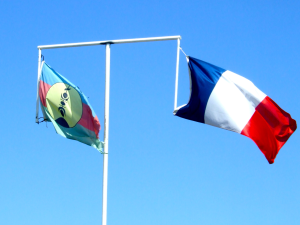As France grapples with the tensions of its colonial past, and the unease in which it is navigating the decolonization process, a pair of French ministers visited New Caledonia this week.
French Home Affairs and Overseas Minister Gérald Darmanin made his fifth visit in the last year to New Caledonia this week, with Finance Minister Bruno Lemaire in tow. A major focus of the recent visit by the two ministers was the French Pacific territory’s ailing nickel industry.
RNZ reported that Darmanin’s visit was packed with meetings with both pro-independence and pro-French groups, in similar circumstances to a series of meetings that took place in Paris in September. There remains significant agitation between the two parties, as well as the French government.
Darmanin’s goal was to get all the parties together in the same room, often referred to as a “tripartite” strategy. However, the pro-independence Union Calédonienne (UC), one of the main members for the Kanak and Socialist National Liberation Front (FLNKS), has said since September that they will not attend any tripartite negotiations. Instead, they desire bilateral discussions with the French government. Darmanin met with UC bilaterally but expressed disappointment that they hadn’t come to the table with the other players in the debate.
In September, UC said that Darmanin’s proposals – which they labelled a “martyr” document – were unacceptable. The document, which was submitted by Darmanin in draft form in September, is thought to be a preparation for a constitutional amendment that French President Emmanuel Macron has said could be put to a vote in 2024. It would touch on the “special” provisions afforded New Caledonia as an overseas territory.
RNZ reports that there have now been several drafts of the document with some contentious subjects: the introduction of New Caledonian citizenship that would be compatible with French citizenship, the reform of the electoral roll for local elections, and different ways – other than a binary yes/no referendum – to enact change.
Currently the electoral roll – enacted under the 1998 Nouméa Accord – is frozen, and only allows French citizens born in New Caledonia or having resided there before 1998 to vote. Critics say this has the effect of disenfranchising over 10,000 otherwise eligible voters. The Council of State in France is being asked to make a ruling on the validity of this in reference to the French Constitution.
Against the backdrop of these discussions is the lingering question of New Caledonian independence. New Caledonia has had three independence referendums, the last in December 2021. All have resulted in the majority of voters choosing to remain French.
The latest referendum was boycotted by the Indigenous Kanak population, after their call to have the vote postponed in the aftermath of significant deaths resulting from COVID-19 was rejected by France. The vote saw an overwhelming victory for the pro-France camp (96.5 percent) but with a voter turnout almost half of what was seen during the referendums of 2018 and 2020.
Protests have taken place in the streets of Nouméa. RNZ reports many waved Kanak flags and brandished banners reading, “We will never give up on our fathers’ dreams.”
France has struggled in general to manage its colonial past, with the French ambassador’s expulsion from Mali the latest in a line of failures to maintain strong relationships with its former colonies.
In July, Macron decried the pro-independence movement for sidelining talks with France. Euronews reported that Macron offered Caledonians two options: “forgiveness” and “the future.”
He told a 10,000 strong crowd in the Caledonian capital that he did not “underestimate the disappointed aspirations of those who defended a completely different project” but said that after three “no” votes it was time to pursue a “new project”: New Caledonia in the Republic.
Meanwhile, New Caledonia is struggling economically, as its nickel industry flags. September saw Glencore, the Swiss multinational commodity trading and mining company, announce it would cease funding the loss-making Koniambo Nickel SAS (KNS) business it co-owns in the territory. While Glencore will continue financially supporting operations until February 2024, this has put pressure on the already struggling nickel sector in New Caledonia.
During his visit this week, Lemaire, the French finance minister, visited all three nickel plants in the territory, and said solutions needed to be found immediately.
“France is ready to commit itself to taking part financially in future reforms, provided they are economically profitable,” he said.
Glencore has contributed $9 billion since its inception, Reuters reported, and would be prepared to explore options with the French government and joint shareholder to seek options to stem losses, including looking at alternative sources of funding.
While nickel demand is booming worldwide – despite a 17.03 percent decrease in prices from this time last year – high production costs have made New Caledonian nickel uncompetitive comparatively with other nations.
France’s Pacific territories – not only New Caledonia but also French Polynesia and Wallis and Futuna – give it a direct stake in the region, something Paris is keen to maintain. French Ambassador for the Indo-Pacific Marc Abensour wrote in The Diplomat in June that France “wants to act as a stabilizing power, committed to effective multilateralism based on the rule of law and the refusal of coercion.”
France is wary of any anti-China sentiment the United States puts forward and has intimated it wants to help ensure great power tensions do not boil over in the Pacific. Whether this ambition is foolhardy, self-promoting, or honorable (or a combination of all three) remains to be seen.

































